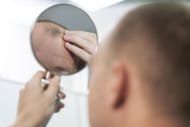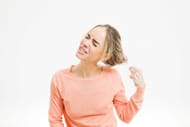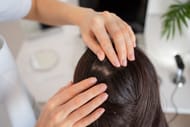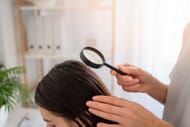If you are looking for the best possible treatment for scalp eczema, your search ends here. Eczema doesn't just affect parts of your body in apparently visible ways, but it can also affect your scalp. In reality, scalp eczema is a form of eczema that results in dry, itchy, and inflammatory skin on your scalp. Sometimes, seborrheic dermatitis, also known as dandruff, is eczema that affects the scalp. It is referred to as cradle cap in infants.
In contemporary medicine, the precise cause of eczema is unknown. It might be connected to Malassezia, a yeast (fungus) that lives in the skin's oil secretion. It might also be the outcome of the immune system's inconsistent reaction. According to conventional medicine, dermatitis results from imbalances in the body's natural physiological processes, particularly those of the skin, which are influenced by a variety of internal and external causes.

Treatment for Scalp Eczema
Scalp eczema is not 100% curable, although treatments can lessen and prevent symptoms. The intensity and other factors that contribute to scalp eczema development will also influence how it is treated.
The following are potential prescription treatments for scalp eczema:
1) Hydrate Your Scalp

Similar to the skin on the body, the skin on the scalp needs moisturizing, but getting past the hair on the scalp can be challenging. By splitting the hair, medical moisturizers can be massaged into the skin on the scalp. Emollients with an ointment base, however, should not be used because they are greasy and challenging to remove.
Emollients in the form of lotions, gels, and spray-on oils are generally helpful. Coconut oil is a homemade remedy, preferred in many households, although olive oil, on the other hand, is not helpful in the treatment of scalp eczema. Many people like to apply moisturizer to the scalp in the evening, cover it with a cotton turban or shower cap to hold it in place overnight, and then rinse it out in the morning.
2) Managing Flare-Ups

The course of treatment for scalp eczema is comparable to that for other body parts. Try massage treatments into the scalp rather than the hair. In fact, a common mistake that we make in the process is massaging the hair.
It is possible to prescribe topical steroids designed for use on the scalp. The most comfortable solution for the scalp may include lotion, mousse, or gel formulations. A moderate topical steroid cream may be administered for young children for a brief period of treatment for scalp eczema. It is important to consult your doctor on even the type of product that will suit you. While these are popular products on the market, they may not necessarily be right for you.
3) Prevention is Better Than Cure

Eczema flare-ups can occasionally be brought on by anxious or stressful circumstances. The best techniques to manage stress include exercising, meditating, eating well, and sleeping well. Regularly washing your hair and scalp with warm water and a mild shampoo will help prevent eczema and remove sweat and buildups on the skin that might cause it.
Moreover, try to limit your exposure, as much as possible, to specific substances or goods, such as harsh soaps and shampoos, hair dye, and very hot water. A flare-up of eczema may also be caused by several drugs.
Seborrheic eczema, or scalp eczema, is a type of eczema in which dry, red, scaly patches appear on the scalp as well as on the nose, eyebrows, and ears. Dandruff, itchy, dry skin areas, irritation, and discoloration can all occur from this.
Wait until you've seen your dermatologist before using any new hair treatments, including anti-dandruff shampoo. Since unfamiliar components may irritate certain people, medicated rinses or shampoos may have more negative effects than positive ones. Living with scalp eczema can be significantly easier if the correct treatment for scalp eczema is found and preventive steps are taken.
Janvi Kapur is a counselor with a Master's degree in applied psychology with a specialization in clinical psychology.
What do you think of this story? Tell us in the comments section below.
